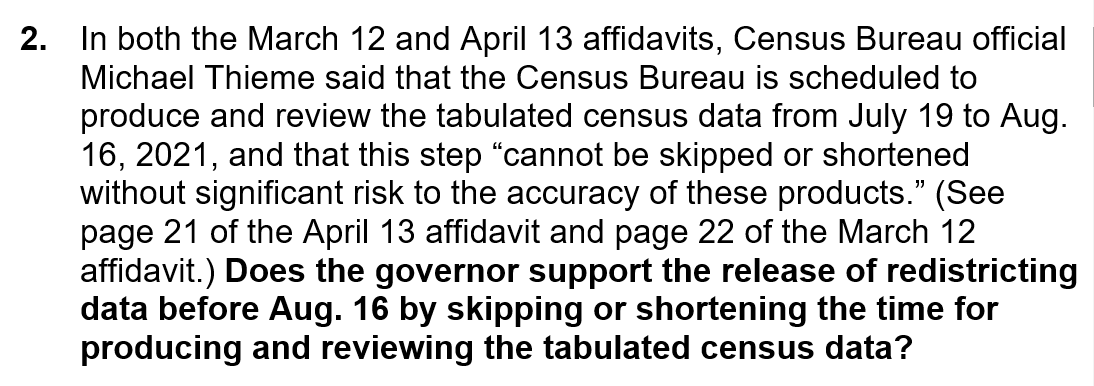NEW: 15 GOP governors are calling for the Census Bureau to move up the release of 2020 census redistricting data (still expected by 8/16) to as early as this month, which would cut short the time for applying privacy protections & checking data's accuracy
documentcloud.org/documents/2097…
documentcloud.org/documents/2097…
2. The letter from 15 Republican governors (1st reported by @ZachMontellaro) cites June 24 as the expected completion date for "nearly all of the data processing necessary for the public release" of redistricting data" — while leaving out key details from bureau's court filings.
@ZachMontellaro 3. Applying formal privacy protections is “expected to take three weeks” after June 24 & this step in producing 2020 census redistricting data is “not optional," according pages 19-20 of this April 13 affidavit filed in federal court by the Census Bureau:
documentcloud.org/documents/2061…

documentcloud.org/documents/2061…


@ZachMontellaro 4. The Census Bureau is scheduled to produce and review the tabulated 2020 census redistricting data from July 19 to Aug. 16, and this step “cannot be skipped or shortened without significant risk to the accuracy" of the data, according to page 21 of the April 13 court filing: 

@ZachMontellaro 5. The letter, which includes Alabama's governor's signature, doesn't mention that state's lawsuit, which Census Bureau said in court filing could "add significant additional time (at least several months) to the schedule for delivering redistricting data”
https://twitter.com/hansilowang/status/1402631418983981057?s=20
@ZachMontellaro 6. I've reached out to the press contacts for the governors of these 15 states with questions about their letter on 2020 census redistricting data:
Arkansas
Alabama
Arizona
Florida
Georgia
Iowa
Missouri
Montana
Nebraska
North Dakota
Ohio
South Carolina
Tennessee
Texas
Wyoming


Arkansas
Alabama
Arizona
Florida
Georgia
Iowa
Missouri
Montana
Nebraska
North Dakota
Ohio
South Carolina
Tennessee
Texas
Wyoming



@ZachMontellaro 7. Many state/local officials are behind in prepping for elections bc of delays w 2020 census redistricting data, which Census Bureau says it deprioritized due to Trump admin's last-minute changes to try to expedite congressional apportionment counts. P. 23-24 of 4/13 affidavit: 



@ZachMontellaro 8. UPDATE: Georgia Gov. Brian Kemp has declined to answer these questions and Kemp's "office won’t be commenting beyond the letter" about the 2020 census redistricting data delay, Kemp's spokesperson Cody Hall said in an email. 





• • •
Missing some Tweet in this thread? You can try to
force a refresh






